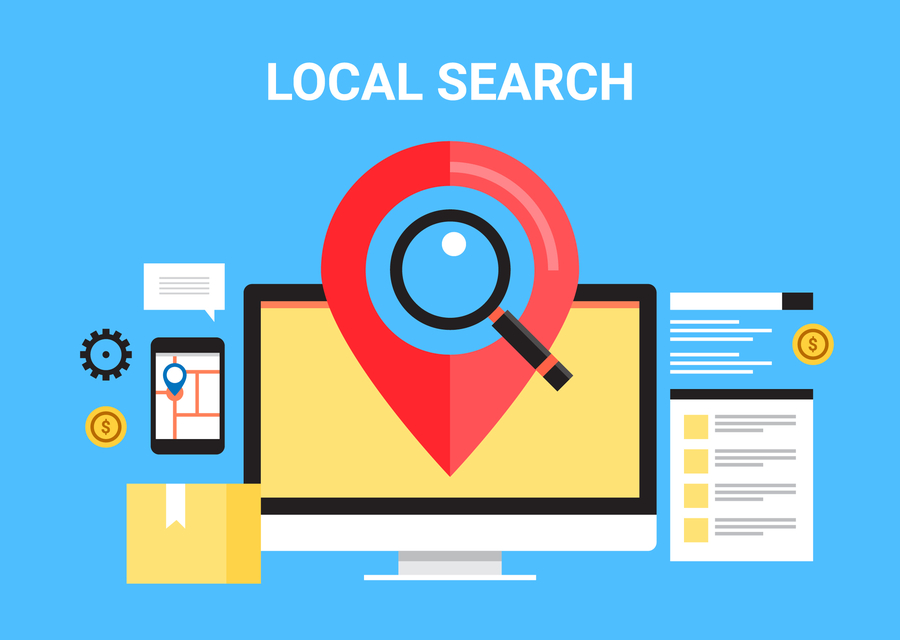6 Ways to Improve Your Local SEO
Business owners can never afford to underestimate the importance of local SEO. Almost half of Google searches are local according to HubSpot, so you need to pump up your local SEO. Your goal is to hit that Google local search “3-pack” so you make it to the top-three results. If you can get your business sitting pretty in one of these competitive slots, you’re going to feel the difference. But how do you do that? Don’t worry we’ve got some ideas.
1. Website Optimization
SEO is search engine optimization, but it’s hard to optimize if you don’t first optimize your website. When applying website optimization, you need some specific strategies to succeed:
- Contact page: Prominent contact info is a must and for local businesses, your address is incredibly important. You need a dedicated contact page with a clear company name, address, phone number and email. If you have more than one location, ensure to provide all of the addresses and phone numbers.
- Clickable contacts: Making it easier to contact you is good for website optimization. Always make your phone number and email address clickable so people can contact you from their cell. Why? Because 76% of local searches lead to phone calls according to HubSpot.
- Add a map: Whether you have one location or 10, adding a map helps. Local SEO means making it easy for people to find you. HubSpot says 86% of consumers use Google Maps to find a business.
- Include testimonials: A real person saying you’re good at what you do speaks volumes to site visitors. When you add testimonials to your site, people trust you. Make sure they are easy to spot when visitors land on your site, to improve your local SEO.
- Use Schema: Schema? Yes, it’s one of those words that can be a little intimidating. It’s just the term for the common language used by major search engines. You can add it to your website, so search engines get what you’re all about. Schema markup sets you apart as a local brand to improve your local SEO. This improves your local ranking. This tool can help: Hall Analysis.
These little adjustments can do wonders for local website/SEO optimization.
2. Claim Profiles
There are tons of online business listings and reviews. In order to get your rankings higher AND ensure your info online is correct, you can claim your online profiles. The most important thing to claim is your Google My Business listing, as most other platforms and listings use this as their base to collect your info.
The 3-pack uses popular sites like TripAdvisor and Yelp in hand with a Google My Business page as a reference point for your business. You’ll automatically show your business profile on Google Maps, so people instantly know what you’re all about and how to find you.
Also, very important to local SEO: Consistent info across all listings and platforms.
Inconsistencies account for 41% of ranking challenges for local businesses. Always make sure you use identical info. For example, it would always be John Street, never John St or John St. This might seem like a silly detail, but it isn’t according to search engines.
Claim your other social profiles on the social media channels popular with your audience. This will increase visibility with existing customers while helping search engines find you.
3. Local Content
You’ll probably scream if you hear anyone mention blogging again, but it is a cold stark reality, it’s essential for today’s local businesses. Inbound marketing allows you to leverage local events and news to speak to your readers while improving SEO. Content should benefit readers without focusing on your products and services. Help, educate and entertain readers to work your way up the local rankings.
Make sure you understand your target, so your content remains relevant and valuable.
4. Link Building
Your blog should be hosted on your website as it adds more internal links which are very important to local optimization. Links are the number one ranking factor for localized organic traffic.
Your posts should always include city names, neighborhoods and unofficial local area names. Local area names not only read more friendly but also help search engines find you when users enter local-centric terms.
Blogging helps you collect inbound links. If you find other local businesses with good blogs, you can partner with them to create mutual linking opportunities. This wouldn’t work with your competition. Instead, look for complementary services like a garden center if you specialize in interlocking brick or a furniture store if you are an interior designer.
5. Build Your Online Reviews
The internet provides hands-on review sites from people who love or hate a business. You can leverage reviews to build your online reputation. Some businesses are worried about bad reviews and ratings. However, even bad reviews can help your business, as long as you are highly responsive to negative comments or complaints. In fact, studies show that 78% of consumers feel companies that respond to comments care about their customers.
If you don’t manage online review sites, you could find yourself in trouble as 97% of customers will use reviews in their buying decision. So, don’t be afraid to ask customers to leave reviews. Keeping a steady influx of reviews improves your online profile. As long as you are customer-focused and provide a first-rate product and service, you’ll be able to kill it review wise.
6. Increase Citations
Citations refer to web pages that mention your business. They do not require a link and just need to have mention of the name, contact info or your website. You can improve your ranking by taking the time to list your business on legit local business directories like Yelp and Foursquare.
It takes time to complete the citations, but it does help. Some other citation ideas could include:
- Local blogs: The more official the site the better, but the ones that pop up at the top of the search rankings will be perfect.
- Locally focused directories: This is another local option to help improve your local rankings. Best of the Web’s Regional Directory is a good start.
- Industry blogs: Industry websites don’t always have a local focus, but they are considered citation sources by search engines. The easiest route is to find an industry association with an online directory.
It’s all about getting creative with your research to find citation opportunities. These ideas will certainly provide an excellent base.
Boosting your local rankings takes effort, but it will be worth it. You’ll increase organic results, which is the best since it’s free. This can provide more leads, which means more revenue. When you combine your outstanding service and quality product with improved local SEO, you’re sure to see growth.
Table of contents
Share this
You May Also Like
These Related Stories

Your Guide to Local SEO

Mastering SEO in 2025: The Updated Guide to Ranking and Driving Traffic


